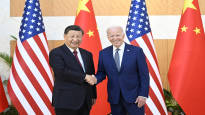The US and Chinese presidents will meet in San Francisco early next week. The relations of the great powers are tested by the trade war and mutual accusations of espionage.
BEIJING The leader of China, i.e. the country’s president and general secretary of the Communist Party, has traveled very little in recent years, even in his home country. Now Xi Jinping travel to the United States and meet the president there Joe Biden.
The visit is followed with great interest because it is so rare. This is despite the fact that a breakthrough in resolving the disputes between the superpowers is not expected.
– I am cautiously optimistic about the meeting, the leading expert of the Beijing-based Taihe Institute Einar Tangen says.
Tangen, who moved to China from the United States in 2005, is one of the most prominent experts on great power politics in China. He is a commentator on numerous international TV channels.
Tangen tells that Biden will arrive with a list of demands. His guest Xi is probably more likely to feel the atmosphere.
According to Tangen, the meeting to be organized in San Francisco at the beginning of next week, apparently on Tuesday, can be a significant opening for discussion. In recent years, the superpowers have treated each other with even more hostility.
Biden and Xi met in Bali in November 2022 at the meeting of industrialized countries In connection with the G20 summit.
Meetings have been organized for the countries’ ministers after the end of the Covid-isolation, but overall, contact between the US and China has been minimal for years. The absence of the so-called hot line of the commanders of the armed forces is particularly worrying.
Foreign minister Antony Blinken suggested opening a hot line to Xi while visiting Beijing in June, but Xi did not warm to the idea.
– China promises to open up to the world, but it needs to show it more concretely. Politics must lead to practical action, says Tangen.
– China needs to understand more deeply its role as a global actor. It has to become more thick-skinned and learn to accept criticism, Tangen breaks down the stakes of the negotiations.
Biden and Xi have at least four topics on their agenda.
1. The Middle East
The Middle East inevitably comes up in Biden’s and Xi’s conversations.
– The United States is in a politically cornered situation. It remains steadfastly in support of Israel. However, it cannot accept the killing of children, even if this happens in counterstrikes against terrorism. It would be easier for the United States if China could offer a solution or at least show the way to negotiations in the Middle East, says Tangen.
2. Trade war
The US-China trade war, which has lasted almost six years, is unlikely to be resolved yet, but even a partial removal of tariffs would be progress.
– It would ease inflationary pressure in both countries, Tangen says.
3. Espionage
Several espionage scandals are causing friction between the two countries. The world’s largest networking equipment manufacturer Huawei has been evicted from North America due to espionage allegations. Last February, the United States shot down a balloon it thought was a Chinese spy balloon.
4. Artificial intelligence and digitization
Biden and Xi are now reportedly discussing for the first time artificial intelligence and digital development, which is dividing the world’s countries even more clearly into rich and poor. China and the United States have a different approach to the subject.
Communist China supports state-led cooperation to develop artificial intelligence, while the capitalist United States is of the opinion that corporate competition should not be restricted, at least significantly.
– China supports international cooperation. We still don’t know what they mean by that, though. The United States would let the market decide, Tangen summarizes.
Biden and Xi will meet on the sidelines of the Apec meeting of the Asia-Pacific Economic Community. The exact date of the meeting at the beginning of next week has not yet been confirmed.
